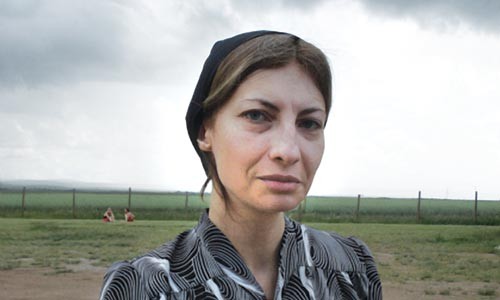Marital infidelity might be the second-oldest narrative around, but the stakes have changed. Try to imagine a contemporary cheating story in which the players not only believe in divinely written fate (or even in the devil) but, more remarkably, in which they don't believe that they have an inalienable right to personal happiness and fulfillment.
You'd probably have to explore some half-hidden subculture, one largely untouched by modern Western narcissism. So Carlos Reygadas does in Silent Light, his 2007 film-festival favorite now hitting U.S. theaters.
Silent Light is set today, in Northern Mexico, but you might not realize it until after the film's hypnotic and wordless first seven minutes. Reygadas time-lapses from starry night through vivid sunrise and into the kitchen of a graying Prussian Mennonite farmer named Johan, as he prays over breakfast with his younger wife, Esther, and their several fair-haired children.
Johan is depressed. We quickly learn it's because he's having an affair with another Mennonite woman, a merchant named Marianne, whom he considers his soul mate.
Silent Light is strange-making in several ways. We're in Mexico, but the characters, culturally isolated, mostly speak a language called Plautdietsch, rather than Spanish. And while the protagonists struggle with their desires against a backdrop of dirt roads and corn fields, there are surprises: Stone-faced Johan, we learn, has apprised Esther of his affair from the beginning, though he keeps swearing he'll end it. And he continually insists to his father -- an even more stoic farmer and preacher -- that his impermissible desires are his own doing, not the devil's, as the old man would have it.
Yet all three protagonists face the consequences of their actions while remaining acutely aware that they are part of a community. It's a community the film neither celebrates nor condemns, but merely accepts as the crucible for human drama.
Stylistically, too, this gorgeously lit film feels timeless, with its serenely intense wide shots, long takes and observational passages of things like Johan's children swimming in a pond. The typically austere framing works well with Reygadas' use of untrained actors: Cornelio Wall as Johan, Maria Pankrat as Marianne, Miriam Toews as Esther. Reygadas' style, and his characters living within a strict social code, often suggests the films of Carl Theodor Dreyer, Danish director of such masterworks as Ordet and Day of Wrath.
Indeed, a kind of Scandinavian fatalism seems to underlie a late stroke of melodrama in Silent Light, one that abruptly truncates the conflict. But then comes the concluding scene, a deeply enigmatic passage that feels more like fable, or even ritual, and suggests that the earthly and the otherwordly are not so distinct.
In Plautdietsch, with subtitles. Anna Groff, assistant editor of The Mennonite magazine, will introduce the Wed., July 29, screening.

Starts Fri., July 24. Harris















